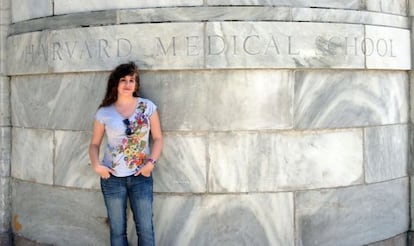“Spain trains us only for other countries to reap the rewards” — cuts lead to brain drain
DNA expert among researchers searching for work abroad as funding for R&D dries up


Leticia Díaz Beltrán is a DNA computing expert, trained at the University of Jaén (UJA) and currently employed by Harvard Medical School. Due to the recession's impact on funding, she spent 18 months working for nothing at the Spanish institute, investigating the relationship between genetics and autism.
Díaz's situation did not go unnoticed by the American university, which offered her a one-year contract so that she could finish her doctoral thesis.
"It's frustrating that the Spanish state spends money on our training, only for other countries to later reap the rewards. It doesn't make any sense," she says via email. Díaz describes the research and development panorama in Spain as "devastating."
"Making cutbacks in R&D is the worst thing you can do at a time of crisis; the logical thing to do is invest in knowledge, science, technology and innovation to increase productivity and export values. To incentivize R&D in universities, centers of investigation and companies is primordial right now," Díaz says.
Despite missing her native land, Díaz speaks passionately about Harvard. "Basically, from the molecular point of view, we are searching for the genes that are implicated in autism and their relation with other auto-immune diseases, with the aim of detecting possible therapeutic and pharmaceutical applications, above all for an early intervention for the illness."
In the 2007-08 academic year, an exchange program introduced Díaz to Harvard, which allowed her to return to Jaén and open a new line of investigation into applying DNA computing to autism.
Díaz's contract is for one year and carries a monthly salary of 2,200 euros. Despite her US experience, Díaz is keen to return to Spain when her contract is up but does not view this prospect with much optimism. "The situation for R&D in Spain is demoralizing. I would like to go back to my university and open new lines of investigation and put into practice everything I'm learning here, but it all depends on the opportunities available - I hope the situation changes. If not, I'll have to think about going abroad again," she says.
At the University of Jaén, Díaz's department professor, Francisco J. Esteban, is proud of his pupil's ascent to such a renowned institute. "It represents a huge slice of recognition and a very important advance in the investigations she is carrying out," he says.
Tu suscripción se está usando en otro dispositivo
¿Quieres añadir otro usuario a tu suscripción?
Si continúas leyendo en este dispositivo, no se podrá leer en el otro.
FlechaTu suscripción se está usando en otro dispositivo y solo puedes acceder a EL PAÍS desde un dispositivo a la vez.
Si quieres compartir tu cuenta, cambia tu suscripción a la modalidad Premium, así podrás añadir otro usuario. Cada uno accederá con su propia cuenta de email, lo que os permitirá personalizar vuestra experiencia en EL PAÍS.
En el caso de no saber quién está usando tu cuenta, te recomendamos cambiar tu contraseña aquí.
Si decides continuar compartiendo tu cuenta, este mensaje se mostrará en tu dispositivo y en el de la otra persona que está usando tu cuenta de forma indefinida, afectando a tu experiencia de lectura. Puedes consultar aquí los términos y condiciones de la suscripción digital.







































